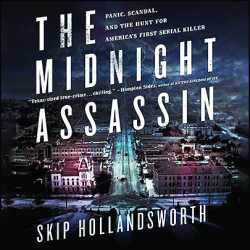Prof. Gershman Reviews The Midnight Assassin
 Prof. Bennett L. Gershman of the Elisabeth Haub School of Law at Pace University has reviewed a new book, The Midnight Assassin by Skip Hollandsworth. In his review, The Midnight Assassin: Panic, Scandal, and the Hunt for America’s First Serial Killer. Prof. Gershman lends his prosecutorial eye to Hollandsworth’s written account of an unsolved series of murders – believed it to be the America’s first serial killer case. Prof. Gershman writes
Prof. Bennett L. Gershman of the Elisabeth Haub School of Law at Pace University has reviewed a new book, The Midnight Assassin by Skip Hollandsworth. In his review, The Midnight Assassin: Panic, Scandal, and the Hunt for America’s First Serial Killer. Prof. Gershman lends his prosecutorial eye to Hollandsworth’s written account of an unsolved series of murders – believed it to be the America’s first serial killer case. Prof. Gershman writes
Set in Austin, Texas—the capitol of the newly minted Lone Star state— The Midnight Assassin recounts a series of eight ghastly murders that were committed during the years 1884 and 1885. More like annihilations, these butcheries incited panic and paranoia in this frontier town of 17,000 people, and undermined municipal efforts to make Austin a mecca of prosperity and modernism.
The killer was never caught, although tantalizing clues point to several potential suspects. Some observers believe that the killer fled Texas, traveled to London, and recreated himself into the legendary Whitechapel killer famously known as “Jack the Ripper.”
Prof. Gershman mentions a PBS TV documentary that identified the killer as 19-year old Nathan Elgin, who was allegedly apprehended at a crime scene, whose involvement was supported by additional circumstantial evidence, and after whose death these killings stopped. Yet, Hollandsworth discounts this possibility in his book leaving readers with a well-written dramatic story of one of the oldest (and almost forgotten) murder mysteries in the history of America.
Related Readings:
- Bennett L. Gershman, The Midnight Assassin: Panic, Scandal, and the Hunt for America’s First Serial Killer, New York Law Journal of Books (2016).
- The Servant Girl Murders, Austin, Texas 1885 – The Servant Girl Annihilator.
- Rebecca Salinas, Look Back at the Serial Killer that Terrorized Austin in the 1880s, MySA (Apr. 28, 2015).
- Skip Hollandsworth, Capital Murder: Who Murdered Seven Women and One Man in Austin in a Brutal Year-Long Spree that Began in Late 1884? I’m Hunted by the Details of his Crimes – and I’m not Alone, Texas Monthly (July 2000).
- Travis Willmann, Interview: James Galloway on The Servant Girl Murders, Ephemera News – Tex Libris (Jul. 10, 2014).
- PBS TV, HDSI – Texas Servant Girl Murders, History Detectives Special Investigations (Season 11).
- Macabre Tourist, Servant Girl Annihilator, YouTube (Jun. 5, 2015).
- Servant Girl Annihilator, Wikipedia.
